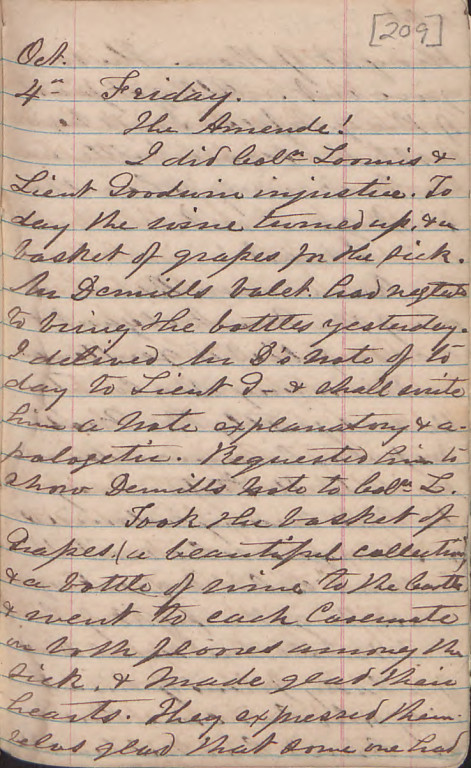Item description: Diary entry, 4 October 1861, of Thomas Sparrow, captain of Company A, 7th North Carolina Infantry (“Washington Grays”), written while Sparrow was imprisoned at Governor’s Island, N.Y. The entry continues a thread from the previous day, giving an update on a lost bottle of wine. The entry also describes a visit from an admirer of fellow prisoner Commodore Samuel Barron (1809-1888).
Thomas Sparrow (1819-1884), a native of New Bern and resident of Washington, N.C., was a lawyer, state legislator, and Confederate officer. Sparrow was educated at Princeton University, 1839-1842. In 1847 he moved to Washington, N.C., and there had a law practice with Edward Stanly. He served as chairman of the Eighth Congressional District Whig Committee and in 1856-1857 as a representative in the North Carolina General Assembly. At the outbreak of the Civil War, Sparrow raised a company of Beaufort County, N.C., volunteers, the Washington Grays, and served as captain. His company was involved in the defense of Fort Hatteras where they were surrendered and captured. He was imprisoned at Fort Columbus, N.Y., and Fort Warren, Mass., until February 1862. Upon parole, he returned to North Carolina and served as major in the 10th North Carolina Regiment. After the war he returned to law practice and again served in the General Assembly, 1870-1872 and 1879-1890. While serving as the chairman of the House Judiciary Committee, 1870, he was manager for the house of the impeachment of Governor William W. Holden.
Item citation: From folder 7 in the Thomas Sparrow Papers, #1878, Southern Historical Collection, The Wilson Library, University of North Carolina at Chapel Hill.
Item transcription:
Oct. 4th, Friday
The Amends!
I did Coln. Loomis & Lieut. Goodwin injustice. To day the wine turned up, & a basket of grapes for the sick. Mr. D[?]’s valet had neglected to bring the bottles yesterday. I delivered Mr. D’s note of to day to Lieut. G. & shall write him a note explanatory & apologetic. Requested him to show D[?]’s note to Coln. L.
Took the basket of grapes (a beautiful collection) & a bottle of wine to the Castle & went to each casemate in both floors among the sick, & made glad their hearts. They expressed themselves glad that some one had thought of them. The wine gave out. All got part of the grapes. I will begin with the second bottle in the morning where the first gave out.
I must!
Commodore Baron is one of the most elegant and accomplished gentlemen in this or any other country. He was justly the most popular commander in the late U. States Navy. He has many admirers & strangers who visit the island exhibit great eagerness to get a sight of him.
He told me several times of a lady friend of his in the city who had come here to see him & had not been able.
4 Oct.
Once she asked only to be allowed to look at him, & was not allowed. She wrote several letters signed with her initials & these were sent back. The commodore wrote her that he occupied the West room of the North building, & on a certain occasion would signal her with his handkerchief. This he succeeded in doing.
This noon, two ladies entered the enclosure, one with Coln. Loomis, & one with a strange gentleman. They seemed to be taking a view of the fortifications. They passed at the West end of this buildingn to the rampart in its rear, & gazed very intently at Com. B’s
4 Oct. ’61
room. Lieut Sharp was at the time cutting the hair of Coln. Pegram on the piazza in front of the Commodore’s door. This greatly amused the ladies. Not long after this the Commodore chanced on the piazza. The visitors passed under him, looked up, & he recognized his friend. He saluted her & began to talk to her. Coln. L. looked surprised. The Com. spoke of her visit, her returned letters, &c. Oh! said the Coln., you are the lady who came here at such a time! In response to this she said naively to the Commodore, Coln. L. does not know me yet. The Coln. (her arm in his) gave her a pull, & said let’s go. Come along! The visitor turned to the Commodore & remarked, “The Coln. says I may kiss my hand at you.” S[?] the action to the [?], she turned back as the Coln. walked her off, & kissed the back of her hand. The commodore uncovered. The visitor looked back towards him until she turned an angle in the walk, entered the sally port, & was out of sight!
All honor to the brave women of the South. They have patriotism & spirit & one never afraid to avow their feelings. Lincoln’s Government has had the meanness to imprison some.








The incomplete phrase is “S[uiting] the action to the [word]”, a common enough expression.